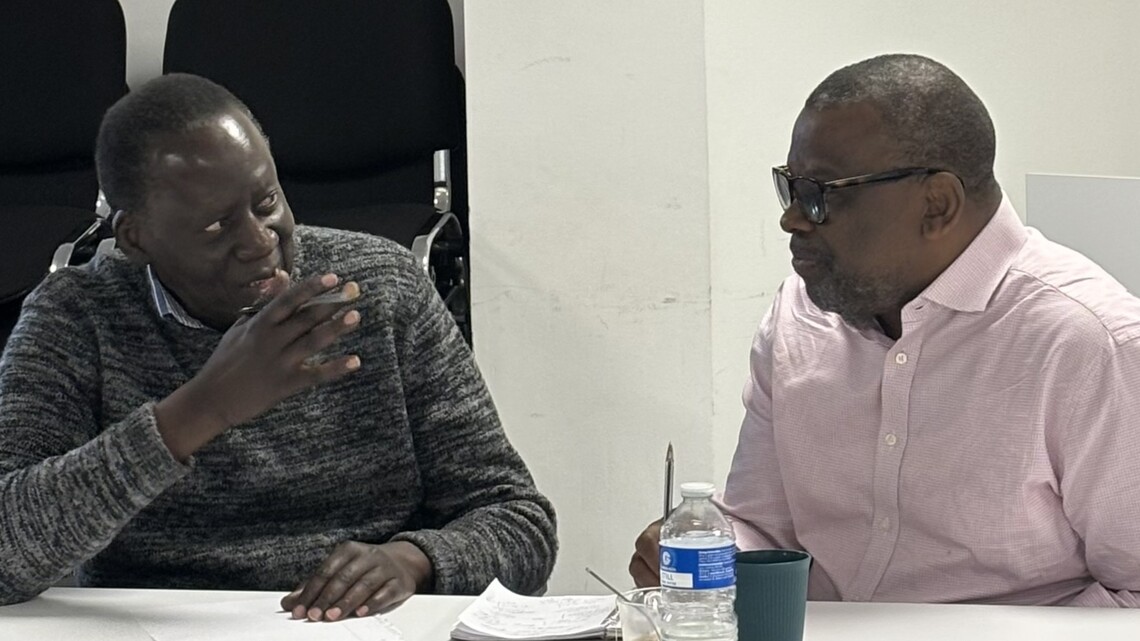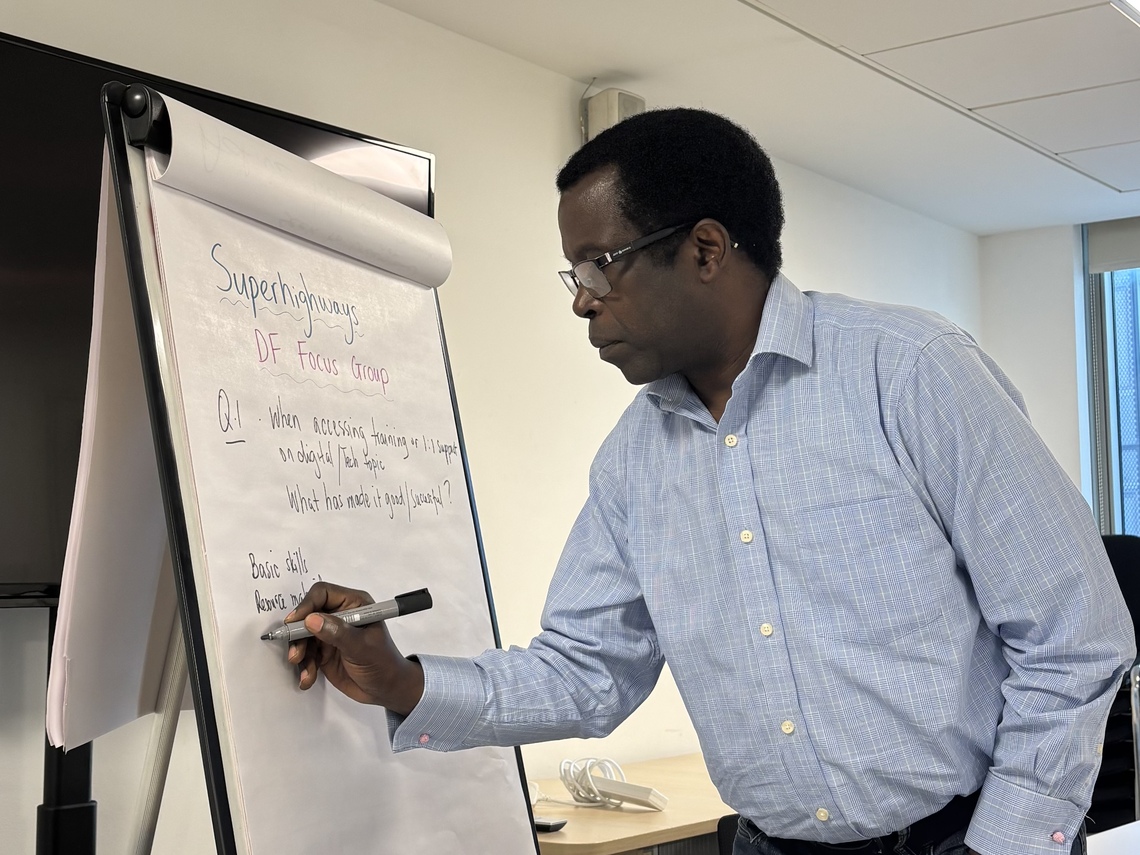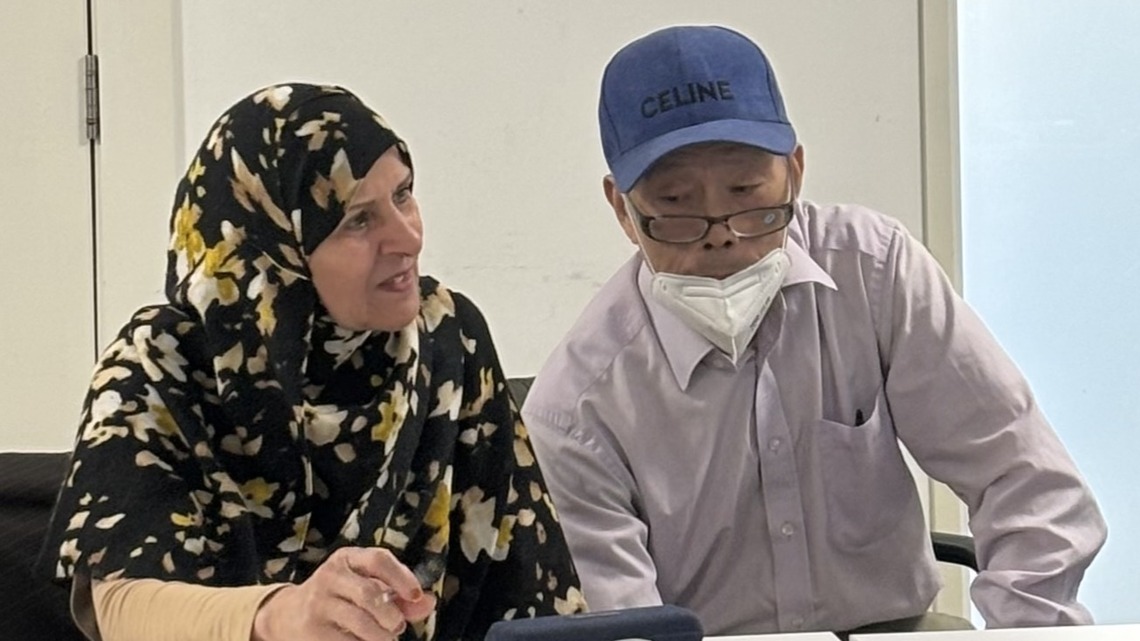Guest blogger Christine Goodall, Network Coordinator at the HEAR Equality and Human Rights Network shares learning from two recent focus groups with its members and refugee community organisations in London.
She was joined by Ezechias Ngendahayo from the Refugee Council.
Digital Foundations is a partnership project funded by The National Lottery Community Fund and led by Superhighways, with HEAR Network and the Refugee Council as partners.
It provides a wide range of support for small equality focused charities and community groups around all aspects of digital and tech, to help these groups run more efficiently and effectively for their beneficiaries.
One of the roles of HEAR and the Refugee Council is to assist in evaluation of the project and its impact on recipients, who are largely member groups of our respective organisations.
In this role, during March and April 2025 we ran two focus groups to help understand in more depth both the impact of support provided and future needs and priorities. One of the groups was held online and the other in person, with groups attending via Zoom and face to face.
Group Dynamics

Before going on to talk about the learning from the groups it is worth first considering how the ways in which the groups were organised and delivered impacted on their effectiveness, both for the participants and for project learning.
Whilst the online delivery obviously had some advantages in that participants did not have to travel, so making participation more straightforward for those short of time or who were
situated a distance from the venue or had accessibility needs, it was noticeable that the in-person group seemed to create a valued networking and peer learning space for participants that went beyond the formal group activities.
They were quite similar in that they were all fairly small organisations of and for various global majority communities, with some having an intersectional focus around for example women, disability.
In-person vs online experience
The in-person group were all either HEAR Network or Refugee Council members (with some cross-over so some members of both) who had either not accessed support from Digital Foundations or only very minimally. The online group had all accessed support from the project.
Not only was it clear that the in-person group valued the opportunity to meet in person and share experiences, but this dynamic also provided richer material for the focus group, because participants ‘bounced’ off each others contributions and answers in a way that did not happen in the same way online.
It was also easier to ensure that everyone was included and contributed; online it was easier for some to sit back despite the efforts of facilitators. Lastly, the in-person group required quite a lot more time than the online one; extra time was allocated but even more could have been devoted and participants still had a lot to share.
The fact that there was a networking lunch immediately afterwards at least allowed for continued sharing.
Imperatives for participation and understanding the blocks
Project partners were keen to understand what factors either prevent people in small charities and community groups accessing tech and digital support or make it difficult to put into practice what has been learned. Conversely, what makes seeking support or training an imperative?
Capacity was clearly a big issue for many
People described the urgent need of their beneficiaries and the importance of prioritising direct service delivery and support over other matters, however important. Frontline community groups serving disadvantaged communities are often the type of group most in need of tech support but perhaps least able to take advantage of support, training and advice.
I got the message but I don’t have time to attend or to book or I have not looked closely to know the extent of the support.
Some people who had not accessed Digital Foundations said that they often didn’t hear about opportunities because they were snowed under with so many emails that communications about training and support often got overlooked.
It wasn't obvious what support was available
Information that was not clear about what support was available, in a concise and accessible format, was also mentioned as a barrier.
Some participants suggested that success stories and positive case studies would be helpful in publicity materials to show in an accessible way the benefits of improving the digital infrastructure of an organisation and accessing support and training.
Funding was also identified as a factor
Sometimes tasks and projects where the digital and tech support was needed get paused or discontinued because funding is withdrawn. Funding for new hardware or software is also a barrier; if equipment is too old or inefficient it is not possible to take advantage of some training or put new ideas into practice.
Training had to be relevant
Participants consistently said that they were most likely to attend training or put support and learning into practice if it was an essential factor for delivery of their immediate frontline work. If it was needed immediately it would be prioritised, if not then it was put to one side as not important.
One participant said that it wasn’t enough for training to be "interesting", it needed to be "immediately relevant". Training being at the right level was also important - too advanced and people get left behind, not detailed enough it ends up being wasted time.
Sometimes when we attend a training session some of us are left behind, the level of other people may not be where we are at.

Group vs one-to-one training
Aligned to the level of training, other factors about delivery were important.
Some people mentioned liking group sessions with other colleagues from their organisation, to embed learning across the team, or with peers from other organisations to share experiences; others mentioned a preference for one to one support.
A mixture of approaches might be appropriate depending on the context.
Cascading the knowledge through an organisation was really important as otherwise people left and the skills were lost:
People have been trained but quickly move on.
Maintaining trust and confidence
Having trust and confidence in those providing the support was also mentioned for small groups, especially for those set up to serve a particular community.
For example, an understanding of culture and language was important for the Chinese community, even down to the fact that they might use different software or social media platforms in their work, for example We Chat and Deep Seek.
Feedback from the community
The impression that the organisation was giving to beneficiaries, the wider community or funders was also mentioned as an important factor in identifying priorities.
For example, one participant described receiving so much negative feedback and criticism about the groups website that doing something to update it became essential.
Giving a professional impression and being taken seriously as an organisation were also mentioned in respect of domain names and organisational email addresses, rather than reliance on personal emails or gmail.
Reliance on others
Feeling embarrassed about needing to rely on others, including colleagues, volunteers or trustees, even family members, to carry out tasks was also a spur, as well as the practical issues around such reliance (the volunteer leaves, the family member or trustee is not available/on holiday etc.).
That's why we let the thing get so run down because I didn't like to ask another busy person.
What attracted me to sign up was the fact that I could learn how to do it rather than always having to rely on somebody else.
Communicating effectively with beneficiaries and the wider community/audience/stakeholders was also mentioned as a spur to seeking support; groups want others to know about their work and activities, grow their networks and raise awareness of the issues faced by their communities. Effective digital communications also helped to raise funds.
Beyond the practical-feelings about tech
The day to day use of technology to carry out work tasks is not only influenced by practicalities like cost and skills; feelings about using technology can both create barriers and spur on creativity and innovation.
Participants were asked about their feelings day to day when using tech in their work. Some people identified worry as a very common emotion when faced with using digital tools, including lack of confidence and a fear of needing help and not being able to get it.
Using tools regularly was identified as important for building confidence, the fear often came when faced with using new tools or going back to something after a long gap. Constant updates and new versions of software cause problems, as familiar tasks can change overnight, leading to frustration.
Some people said they felt embarrassed about needing support, or taking a long time, so causing delay for colleagues. Some identified quite extreme negative emotions they had experienced, including "panic", "trauma", "worry" and "feeling nervous".
Panic rises as soon as something doesn't work as it should and you've no idea how to solve it.
Sometimes I Google how to do something and it could be written in Greek, I can't understand the answer, then I get very frustrated.
However some people described "having fun", "feeling confident", "keen to learn more" and "feeling happy". It’s clear that availability of support and building skills and confidence is important to break down the barriers that fear and worry can create.
Looking to the future

The digital and technology world has changed rapidly and significantly in the three years since the project began, and particularly in this third year.
The group identified a number of additional and emerging areas of support that they would value from the project going forward.
The most significant of these was around AI.
Some people in both groups had used various AI tools in their work, but all agreed that this was an area where support for small charities and community groups was really important going forward. Participants were aware that use of AI could have both advantages and possible dangers:
I want to know how to use it for our benefit, and not be used by it.
I am ethically frightened by AI, people can be misled […] but we don't have a choice so I want to know how it is useful for our work.
Participants were keen to understand what specific AI tools could help with which tasks, including managing finances and developing content for social media.
They also wanted to explore possible advantages around accessibility and inclusion for disabled people and others with communication needs.
However, there was a lot of mistrust around the use of AI by public bodies, and the potential for discrimination and negative bias (which HEAR has now gone on to do further work with members on).
Other future support needs were focused on understanding more about the complexity of data protection legislation (“it’s a minefield”), particularly in the current climate of constant data breaches and cyber attacks.
Developing policies and strategies around this and on data and tech more broadly was identified as being an important focus for support, as well as understanding more about accessible technology for disabled people.
In addition to AI, participants also identified a range of tools that they would like to know more about. These included CRMs and databases, finance management tools, tools for producing communication materials (for example Microsoft Publisher) and a variety of social media platforms (some come into prominent use and participants may not be familiar whilst being aware of the need to use them, e.g. LinkedIn).
More support on using online meeting tools such as Teams and Zoom was requested; as these methods of meeting have become commonplace since the pandemic there is an assumption that everyone knows how to use them effectively, and this is not always the case for small community groups.
Summing up the positives
Participants who had accessed support from Digital Foundations were asked about what was most beneficial for them and what had worked really well:
- Cost: free support or access to free or low-cost software.
- Specifically designed for small charities and community groups: Superhighways and project partners had an understanding of the challenges faced by them.
- The team: patient, understanding and knowledgeable staff.
- Responsiveness: tailoring support to individual needs, with good follow-up when required.
- The end results: including increased professionalism, increased interaction with their community, greater efficiency and productivity.
The feedback and response to our website has been excellent, I'm enjoying what I’ve learned and moving forward in the digital world.
More information
- Digital Foundations programme
- Take part in our training (full programme launching in the Autumn)
- Contact us for help
Stay in touch
If you would like to receive news and updates about training, tech tips, resources and opportunities for small charities and community groups in London please sign up to our mailing list.
